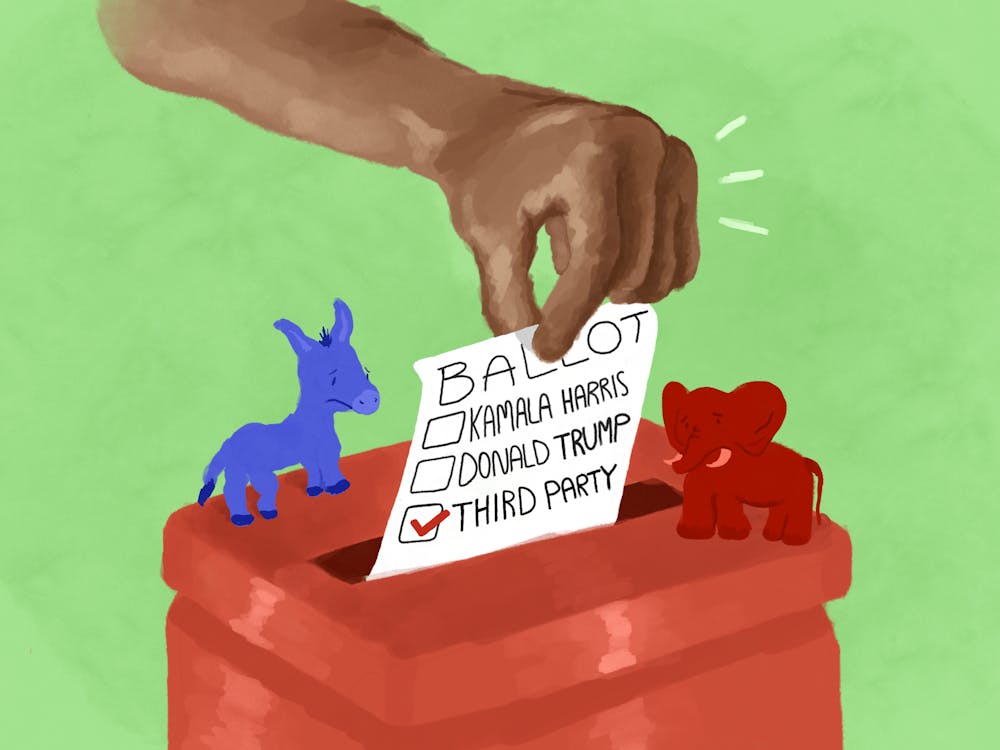In the 2024 presidential election, almost eleven thousand Rhode Islanders cast their ballots for third-party candidates. Third-party voters The Herald spoke to said what many Americans are feeling: they have grown disillusioned with a two-party system and are looking for new representation.
Before the election, some Democrats expressed concerns that third-party candidates could draw vital votes away from Vice President Kamala Harris. And in the wake of Trump’s victory, Brown Democrats President Mahir Rahman ’26 said he has seen backlash against third-party voters, “especially against Muslim and Arab voters who voted for people like Jill Stein.”
But Rahman said this response is not entirely justified. “If you look at the gap between Harris and Trump in a lot of the swing states, the number of votes that Jill Stein got wasn’t really enough for that gap,” he said. In Pennsylvania, for instance, adding the percentage of votes for Jill Stein to Harris’s votes would not have tipped the election in Harris’s favor.
Matisse Doucet ’26, who organizes for the Party of Socialism and Liberation Rhode Island, said that voting third-party is better than choosing between “two bad options.” For Doucet, who voted in California for the PSL candidate Claudia De La Cruz, the third-party movement is more about building momentum for a paradigm shift within politics than about winning an election.
“We’re not trying to necessarily get our candidate into office,” Doucet said. “We’re trying to build a movement of working-class people that puts pressure on the current political system to represent the voices of the people.”
Andrew Rovinsky ’25, a Georgia resident who voted for Harris, said he understands the kind of “grievances” that might lead voters to cast their ballots for candidates like Jill Stein. Ultimately, though, he doesn’t see it as an effective choice.
“I don't blame them for voting for Jill Stein,” Rovinsky said. “I do think by voting for Jill Stein … you are throwing away your vote.”
Rovinsky said that living in Georgia, a swing state, has made him “a little bit more hostile towards third party voting, just because if you do it in Georgia, you're really hurting people.” Compared to “safe blue states,” federal support for Democratic policies in swing states like Georgia can be more impactful given the conservatism of local politicians, he said.
Doucet’s home state played a less significant role in their final decision.
“I think if I was in a swing state … I would probably still be voting third-party,” Doucet said. “I’ve had enough and I think other working-class people have had enough of … having to choose between two bad options.”
Christian Torre, an organizer for PSL Rhode Island, believes that third-party candidates represent alternative voices within an “undemocratic” two-party system.
“Our campaign is a way of saying there is a political platform that represents you, there is politics that speaks for your needs and we’re it,” Torre said.
He also emphasized his view that third-party voters should not be expected to help Democrats in the general election. “What have the Democrats done for us?” he asked.
The ongoing war in Gaza also played a major role in both Torre’s and Doucet’s votes and, in Doucet’s opinion, has been “a big factor” for other third-party voters as well.
“I will never vote for a candidate or a party that so blatantly and explicitly funds ... what's happening right now in Gaza,” Torre said.
Still, both Torre and Doucet stressed that their final decision to vote third-party was mostly influenced by their overall political stances; Torre, for one, also voted for a third party in 2020.
Rahman hopes that Democrats will engage with third-party voters more often going forward.
“Especially after this election cycle and a lot of reflection, post-mortem election analysis, I think Democrats need to work more,” Rahman said. “We have to actually have critical, thoughtful discussion with everyone on the political spectrum.”





